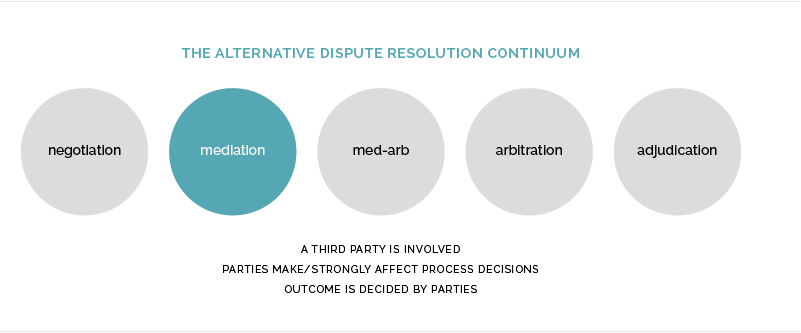
Mediation
Mediation is perhaps the most relaxed and informal of ADR proceedings. During a mediation, the neutral will work to facilitate communication between the parties, identify and reframe the issues, and break the stalemate that has prevented the case from settling prior to the mediation.

Role of the Mediator
Since the mediator is a facilitator of cooperation, neutrality is of the utmost importance during a mediation. Good mediators do not pass judgment on the parties, or assess the value of their case, but rather they listen to the parties, moderate communication between them, and guide the process toward the most satisfactory outcome for all sides. The mediator will steer the conversation away from minor details and legal technicalities to focus the parties on the bigger picture and the primary goals of the proceeding — resolution of the issues involved in the case. Due to the mediator’s unique role as a neutral third party in what is generally an adversarial process, it takes a certain blend of training, ability, psychology, and patience to mediate effectively. At Centerpoint Dispute Resolution we’ve selectively assembled a panel of trained professionals with extensive ADR training who are ready to apply all of their education, knowledge and skill toward the resolution of your case.
A STEP-BY-STEP GUIDE TO MEDIATION AT CENTERPOINT
The Case Management Conference
The mediator will first meet with the parties or their representatives, usually via conference call, for the Case Management Conference, or CMC. This meeting serves as the parties’ introduction to the mediation process and offers them an opportunity to inform the mediator of any special issues regarding their case or to have the mediator clear up any concerns they have about the process.
Also during the CMC, the parties will inform the mediator of their preferred format for the mediation and they may even request the neutral utilize a certain style or approach for the mediation. For example, while the mediator’s role is most often as a facilitator rather than an evaluator, the parties may request that the mediator assume a stronger stance during the mediation. Since the parties retain most of the authority and control in a mediation, as long as they agree that an evaluative approach is appropriate for the case, then the mediator can accommodate that request.
Any other issues that need to be addressed prior to the first joint mediated session will be taken care of during the CMC. Most CMCs take place over the phone for the sake of convenience and the time and cost of travel.
Commencement of the Mediation
There are numerous styles and formats that vary from neutral to neutral, however the mediation usually begins with a joint meeting of all parties in a conference room. During this meeting, the parties or their counsel will explain the case from their perspective and perhaps indicate how they would like to approach a settlement. It’s not merely a chance to restate the adversarial positions and legal claims from the attorney’s briefs but rather it presents an opportunity for the parties to convey their account of the facts at hand. Depending on the complexity of the case and the issues involved, the duration of this session may last several minutes or sometimes hours for especially complicated cases.
It’s important to remember that mediation is strictly a voluntary and safe process. The discussions during a mediation and the materials developed therein are generally confidential and inadmissible in any subsequent court proceeding. The mediator is ethically obligated to assist all parties and ensure that any agreements reached are voluntary and informed. Mediation invites the parties to take a step back from the adversarial process of litigation and assume a cooperative approach to resolve the issues and most importantly, put the whole ordeal behind them. In many cases, mediation is the last opportunity to conclude the matter before resuming the long and expensive march toward trial. Moreover, it may be the only opportunity for the clients to participate in the process since attorneys generally speak on behalf of the client for the remainder of the formal litigation process. As such, the mediator must approach the proceeding with proper care and diligence to ensure the optimal environment for resolution of the dispute.
PRIVATE CAUCUSES
After the joint session, the parties and their counsel may break off into separate caucus rooms to meet individually with the mediator. The privacy afforded by caucusing allows the parties to expand on their opening statements from the joint session and their goals for the mediation in confidence. This also gives the mediator an opportunity to play “devil’s advocate” by questioning the strength and validity of the attorney’s legal arguments. All too often, lawyers will get caught up in the adversarial process, which certainly serves well in their role as a fierce advocate of their client’s interests, however it may lead them to overestimate the strength of their legal positions. During private caucusing, the mediator will try to shift the focus of the proceeding toward the true merits of the case. Doing so is necessary to reframe the issues to focus on the big picture and move the case closer to an equitable settlement.
The Mediator’s Evaluation
After a few hours, if the mediation is not progressing but rather regressing to a stalemate between the parties, the mediator may step outside his role as a mere facilitator and start taking stronger stances on the issues to coax the parties toward a settlement. However, this is typically a last resort used only after all avenues have been exhausted to let the parties settle the case on their own. Even then, the mediator’s evaluation is simply his opinion on the merits and probable outcome of the case; it does not bind the parties in any way, unless they agree to the contrary.
Agreement
Once the general terms of agreement have been reached, the mediator will remain available to provide assistance throughout the process of drafting and finalizing the settlement agreement. Because mediators work for the benefit of all parties to a dispute, they ensure that the finalized settlement reflects the voluntary agreement of the parties and that they are properly informed of the terms.
IN CONCLUSION
Mediation is an impartial, balanced, and safe proceeding. Participation is voluntary and the parties are free to leave the table at any time. However, the parties’ consent to commence the mediation process usually indicates a general desire on all sides to resolve the dispute. Once the parties are ready to put the case behind them, it’s the mediator’s job to do everything is his or her power to make that possible. As such, the mediator plays a valuable and important role for the parties in a case, and it’s vital that such a critical role is entrusted to a capable professional. At Centerpoint Dispute Resolution, you can rest assured that the settlement of your case rests in the hands of a well trained and knowledgeable mediator.
Centerpoint Dispute Resolution offers a FREE 15 minute phone consultation. Call 314-645-1500 now, or complete the Submit Your Case form link below if you are ready to proceed. Settle your dispute quickly and inexpensively. We are here to help answer your questions.
Why You Should Choose Med-Arb
- Combines the best of mediation and arbitration
- Disputes can be resolved quickly and with a sense of finality
- Preserves relationships
- Confidential, not of public record, process is closed
- Less formal and more flexible process
- Affordable

